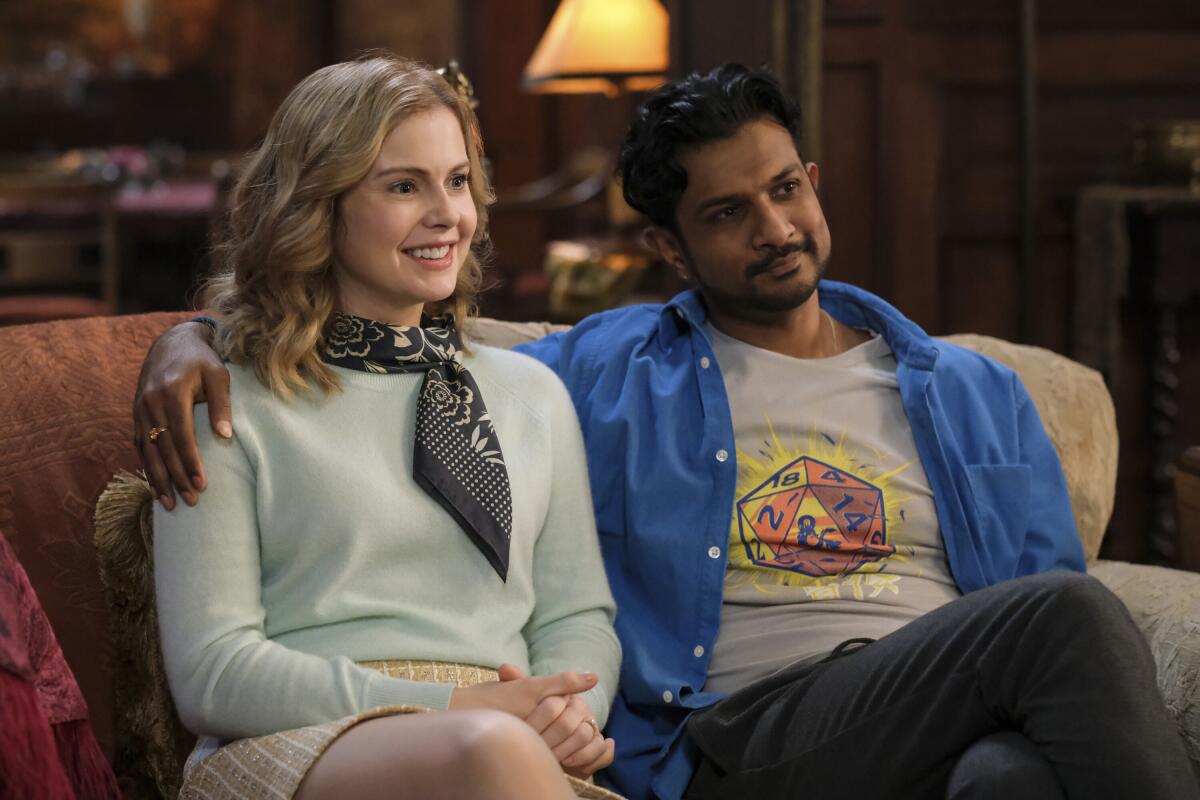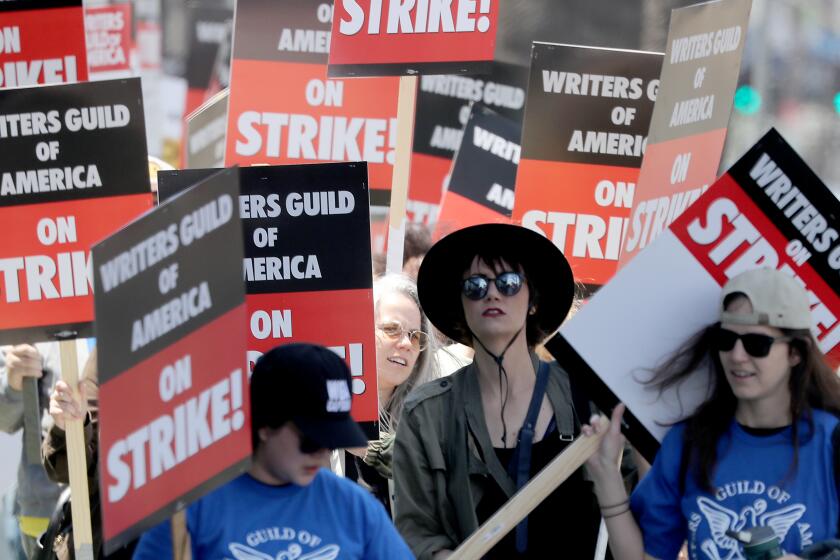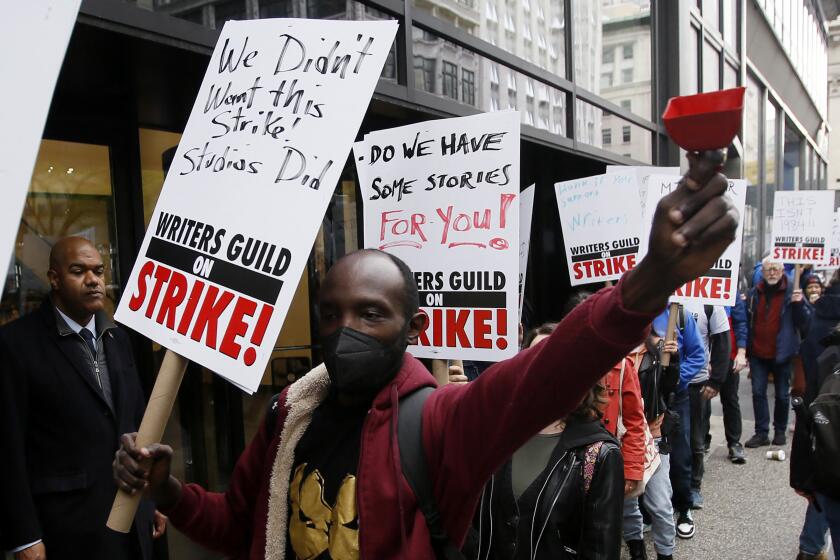What shows are affected by the writers’ strike? ‘SNL’ and late-night are among the first
- Share via
It won’t be a late night with Seth Meyers or Stephen Colbert or either of the Jimmys for a while.
Movie and television writers moved ahead with a costly industrywide walkout for the first time in 15 years. The Writers Guild of America, which represents 11,500 television writers and screenwriters, announced late Monday that a strike would begin early Tuesday, with picketing commencing in the afternoon, after negotiations with the Alliance of Motion Picture and Television Producers, which represents Hollywood studios, failed to yield a new deal before the current guild contract expired.
For TV fans, it means that the writers behind your favorite shows, like ABC’s “Abbott Elementary,” Showtime’s “Yellowjackets” and Netflix’s “Stranger Things,” are headed for the picket lines. And depending on the duration of the strike, the move either will have a swift or delayed effect on TV production.
Late-night talk shows are the first to be affected, including “The Late Show With Stephen Colbert,” “Jimmy Kimmel Live!,” “The Tonight Show Starring Jimmy Fallon” and “Late Night With Seth Meyers,” as well as those on cable networks like “Real Time With Bill Maher” and “Last Week Tonight With John Oliver.” All rely on guild writers to pump out topical monologues and skits.
TV hosts Jimmy Fallon and Stephen Colbert, whose shows are among the first to be affected by the writers’ strike, voice support for the Writers Guild of America.
Colbert, Fallon, Kimmel and Meyers have already openly agreed to pause production on their shows, which will revert to reruns on Tuesday until further notice. Maher and Oliver’s shows will go dark immediately, with no reruns scheduled.
Meyers addressed the strike with viewers on Monday night on his show, saying it would be interrupted if the strike happened. He voiced support for the writers, telling the audience that the show was built on strong writing.
“Look, no one is entitled to a job in show business. But for those people who have a job in show business, they are entitled to fair compensation. They are entitled to make a living,” he said. “I think it’s a very reasonable demand that is being set out by the guild, and I support those demands. But I also believe that everybody at the table right now, be it from the writer side or the studio side, knows that the future of this business is dependent on storytellers.”
After going dark for a few weeks during the last strike, some of TV’s late-night hosts returned to work without their writing staffs in order to keep other employees working and attempted to pull off their shows as usual; however, others leaned into the bit. Conan O’Brien, then the host of “Late Night With Conan O’Brien,” filled airtime by spinning his wedding ring on his desk and zip-lining over the studio audience.
The 2023 writers’ strike is over after the Writers Guild of America and the Alliance of Motion Picture and Television Producers reached a deal.
Meanwhile, “Saturday Night Live” will air repeats until further notice, NBC confirmed. The show originally had three episodes scheduled to air this month, including one this week with former cast member Pete Davidson as host.
If a strike stretches out for a prolonged period, viewers could next see soap operas, TV series and movie productions affected as the reserve of completed scripts runs low.

There’s now a seemingly never-ending supply of content made year-round — in contrast to the traditional broadcast model of the past, where pilot episodes were commissioned in the spring and new shows were launched in the fall — as the rise of cable and streaming platforms have flooded the landscape. Most broadcast shows, such as ABC’s “Grey’s Anatomy” and CBS’ “Ghosts,” will finish their current seasons, as their finale episodes have already been written and filmed. But a prolonged strike could hold up work on new episodes, which typically happens over the summer, and delay their return in the fall. And shows on cable and streaming tend to have a longer lead time, making it difficult to assess any immediate impact. It would take a prolonged walkout before any critical signs of a slowdown in new TV shows and episodes are felt by viewers.
In recent weeks, programs such as “Hacks,” “Curb Your Enthusiasm” and “Lone Star” have been shooting in Los Angeles, according to data from FilmLA, which organizes permitting for the county. However, “Hacks,” which was in production for Season 3, has now shut down, according to sources. “Loot,” “Quantum Leap” and “Station 19” were among the TV shows FilmLA listed as requesting permits for filming in Los Angeles just this week, although it is unclear whether they would proceed with filming. The data does not account for TV shows currently in production outside of Los Angeles.
In the days before the Writers Guild of America called on members to strike, the creators of hit shows, including ‘Shrinking,’ ‘The Last of Us’ and more, gathered to discuss the state of the industry.
Meanwhile, the scripts for the fourth season of Disney+’s “The Mandalorian” have been written, the show’s creator, Jon Favreau, recently confirmed to the French news channel BFM TV. HBO’s “House of the Dragon” began production on Season 2 last month, and the scripts for all episodes have been completed, according to sources. Writing on the fifth season of “Stranger Things” began last August, but Netflix would not comment on whether the scripts have been completed.
Writers have begun holding demonstrations outside all of the major studios, as well as productions, on both coasts. On the East Coast, guild members are picketing at Netflix’s Manhattan headquarters, Warner Bros. Discovery offices and NBCUniversal’s 30 Rockefeller Plaza. They will also picket outside of Radio City Music Hall later this month, when NBC will host its upfront presentation, in which it boasts its fall slate to advertisers. On the West Coast, writers are convening at the major studios, including the Culver City offices of Amazon and Sony Pictures, and at Radford Studio Center, formerly CBS Radford, where CBS still films some shows.
On what may be the last new episode of “The Late Show” for a while, host Stephen Colbert told viewers Monday night that a walkout by WGA was imminent. “The union could go on strike tomorrow, which means that writers might have to do something totally against their nature — go outside,” Colbert said.
Felipe Torres Medina, a writer on “The Late Show,” was among the approximately 200 WGA members and supporters who formed a picket line that ran for a block along Fifth Avenue in Midtown Manhattan. They marched outside of the venue where NBCUniversal’s Peacock streaming service was booked for an advertiser presentation.
“It’s really important that we protect and have minimums for late-night writers for streaming because we don’t have them right now,” Medina said. “Currently our shows are on TV networks, but that can change at any moment.”
While traditional late-night TV audiences are shrinking, networks often boast about the staggering number of views comedy segments from the shows attract on social media platforms.
As an immigrant to the U.S. from Colombia and a person of color, Medina believes a better deal for the union is the route to improving diversity in writers rooms. “This is about protecting everyone who looks like me who might be joining the union,” he said.
Hollywood’s writers prepare to picket studios after they failed to reach a deal with studios to replace a contract that expired Monday night.
One TV writer-producer taking part in the strike, who requested anonymity because of the nature of their role, said that a writer’s job goes beyond putting words on a page. They explained the effect the strike would have on productions.
“Shows that are still in production will not have writers on set, shows that are still in post will not have showrunners in the editing room or on the soundstage,” they said. “Make no mistake, the editing room and the soundstage are the final rewrites of any episode of television. A writers’ strike will have a very large impact on the quality of the material produced. And shows that are in the middle of their seasons will not have scripts to shoot, which will necessitate a shutdown.”
It’s in keeping with the WGA’s long list of instructions to members about what work they can or cannot do during a walkout. Prohibited conduct includes revising existing work, starting a new project or delivering work to a struck company, regardless of whether they work from home or an office. Writers can’t even discuss work with studios, and they must save a digital date-stamped copy of all unproduced literary material within 24 hours of when the strike begins. Even writer-producers or writer-directors are heavily limited in the work they can do during production and post-production as showrunners. For example, they can’t make cuts for time, make minor changes to dialogue or change stage directions.
Although the WGA can’t stop members from doing purely production work, it is encouraging members not to participate as a way to show support. During the 2007-08 strike, many showrunners refused to do any work for struck companies, according to the WGA.
For another TV writer-producer who spoke on the condition of anonymity, it was business as usual on the production of their show on Monday, with a visit to set and, later, the writers room. They said that the strike would be “really stressful for everybody” as workers waited to see how it would affect their roles.
“Obviously, we all want to work, we all love what we do. And writers are a fraction of the giant family it takes to make television,” they said. “On a show like ours, we have more than 100 people working there every day. And so I think it’s weighing on everybody that this isn’t just about us; it’s gonna affect everybody.”
Whether filming will continue on their show — and other shows currently in production — is unclear now that the strike has begun and many writers are picketing. However, there is a lot of support for the strike from fellow unions, the writer-producer said.
“A show like ours could possibly keep shooting; there are certainly scripts written that they could continue to film, at least a couple more,” they said. “But it’s just a question of who’s going to cross the picket line and who won’t. No one really knows the answer to that.”
Staff writer Stephen Battaglio contributed to this report.
More to Read
Inside the business of entertainment
The Wide Shot brings you news, analysis and insights on everything from streaming wars to production — and what it all means for the future.
You may occasionally receive promotional content from the Los Angeles Times.

















